Biography of Dr. Cheddi Jagan
 Strife not Strike (1963)
Strife not Strike (1963)
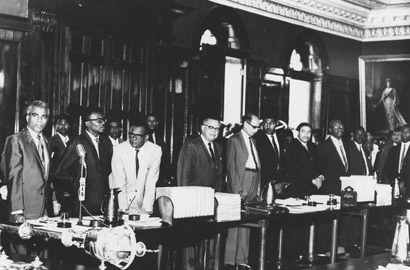
PPP parliamentarians
The strike was marked by continued violence and civil servants on strike were paid by funds provided by the CIA. Those workers who remained loyal were intimidated and harassed. Violence was directed against Indians, anyone suspected as a government supporter, PPP legislators and ministers of the government. It was a year of explicit calls to race and violence by the PNC and a period of wild and false accusations and information by the press which acted as a stimulant to further racial clashes and violence. Every journalistic gimmick was used to whip up racial feelings and spread hate and fear. Blatant calls to violence were often reinforced by various less subtle exhortations to loot and rob. Large photos with racial implications were published almost daily in the press.
In early May 1963 the discovery of the existence of Plan "X" 13 ( arms, weapons, assassination plots and plans for extensive military training by the PNC to forcibly overthrow the government) evoked public horror and caused a temporary halt to the violence.
But by early June the violence was back and soon intensified after the arrival of a Cuban tanker which brought fuel and gasoline in an attempt to break the blockade. Indians in Georgetown were brutally attacked and beaten, sometimes in full view of the police. Unruly mobs invaded government buildings. An attempt was made on the life of Dr. Jagan as he was leaving his office. Several government and Public Buildings were dynamited and blown up.
During this period Dr. Jagan met on numerous occasions with the Governor, the Commissioner of Police and the Commander of the British Troops and requested that the army be deployed on foot patrols all over the city, because the police were incapable of dealing with the situation. His requests were denied because at this point, Britain was caught on the horns of a dilemma. Not wishing to dishonour its pledges, unwilling to use the crude "big-stick" methods of 1953, and unable to stem US pressure, it connived at the CIA backed strikes and disturbances so the world could be told that Guiana, torn by racial strife, was not ready for independence.
Also, in 1963, Dr. Jagan attended an Independence Conference in London. It became clear that the British government had no intention of granting independence while Dr. Jagan and the PPP were in office. Instead, the Conference degenerated into a squabble over the electoral system.
 Force and Fraud (1964)
Force and Fraud (1964)
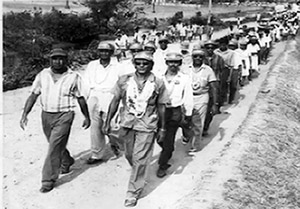
Freedom March & Rally - 1964
Dr. Jagan with the assistance of President Kwame Nkrumah of Ghana was seeking a political settlement. However, the proposals put by Dr Nkrumah’s mission to the country were rejected by the PNC. Thus all efforts failed.
The British Colonial Office, pressured by the Kennedy administration, amended the Constitution to provide for new elections one year ahead of that provided in the Constitution under which the People's Progressive Party had won the elections in 1961. Also, the method of voting was changed from first-past-the-post to proportional representation (PR) in order to block the PPP from taking office again.
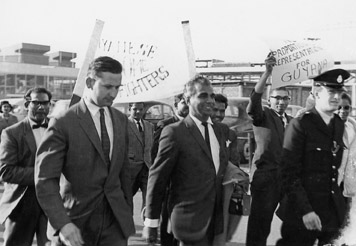
Dr Jagan in London for Constitutional Talks
/Mrs. Jagan in London protesting PR
/Mrs. Jagan in London protesting PR
The New York Times in October 1964, reported that the British government had bowed to the wishes of the USA and had ruled out early independence for British Guiana and would go ahead with the P R elections for December 7, 1964.
The PPP went into these elections under protest, gaining more votes than it did in 1961 - 45.8%, the largest number for any single party. However, the PNC led by Mr. Burnham and the United Force led by businessman Peter d’Aguiar formed a coalition and were asked by the Governor to form the government.
This alliance was manipulated to ensure that Dr. Jagan and the PPP were not allowed to govern, even though the two parties vowed at election time that they would never team up with each other.
 1965
1965
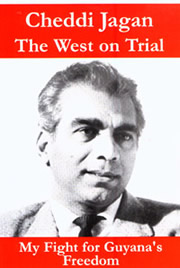
The West on Trial
During 1965, Dr. Jagan wrote the booklet "Anatomy of Poverty in BG" and began his monumental book "The West on Trial." He and his family had moved from Red House, his residence as Premier, to a rented house on Camp Street in Georgetown.
In another message in April, the PPP Leader said, "In our struggle for national liberation, to free our country from the shackles of colonialism and imperialism, we must organise, educate and inform. We must tell the world that our struggle is democratic, nationalist, anti-imperialist and anti-feudal. We must rally all patriotic Guianese behind us. We must fight for the preservation of our fundamental rights laid down in our Constitution."
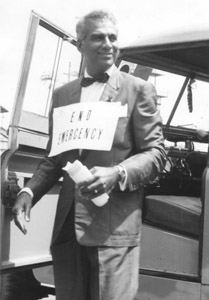
Calling for end of emergency
His theme of unity and racial harmony was repeated. "Racism is the greatest curse of our land.. anyone who spreads racial propaganda must be severely dealt with. Such a person is an enemy to himself and his country."
Dr. Jagan refused to attend the London Conference on Independence until the detainees were released. In December, he charged that the British government failed to grasp the opportunity to help work out a satisfactory solution to the deep-seated political problems of the country. The British government, he charged, also retained the Constitution and electoral system and thus declared the Conference a "farce."
